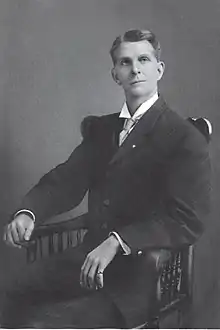William Hopkinson Cox
William Hopkinson Cox (October 22, 1856 – October 13, 1950) was an American politician, who served as the 30th Lieutenant Governor of Kentucky from 1907 to 1911, under Governor Augustus E. Willson.
William H. Cox | |
|---|---|
 | |
| 30th Lieutenant Governor of Kentucky | |
| In office December 10, 1907 – December 12, 1911 | |
| Governor | Augustus E. Willson |
| Preceded by | William P. Thorne |
| Succeeded by | Edward J. McDermott |
| Member of the Kentucky Senate | |
| Personal details | |
| Born | October 22, 1856 Maysville, Kentucky |
| Died | October 13, 1950 (aged 93) Mason County, Kentucky |
| Political party | Republican |
| Spouse(s) | Susan E. Farrow |
| Signature | |
Early life and family
William Cox was born October 22, 1856 in Maysville, Kentucky.[1] He was the son of William Hopkinson and Elizabeth R. (Newman) Cox.[2] His paternal grandfather, George Cox, immigrated from London, England in 1817 and founded a dry goods store in Maysville, Kentucky in 1819.[2]
Cox was educated in the private schools of Maysville.[2] He began working in the family store at age fifteen, and he and his brother George assumed operation of the store when their father died in 1885.[2] In 1904, the brothers sold the successful business to the firm of D. Hunt and Son.[3] In 1889, Cox became president of the State National Bank in Maysville, holding this position until 1901.[1][2] He was also director of the Electric Light and Gas Company for a time.[2]
Cox took an active part in the development of Maysville, financing the construction of the Cox Building in that city.[4] He also owned a housing terrace on Market Street between Third and Fourth Streets in Maysville, which became known as the Cox Block of Maysville.[2][4]
In 1880, Cox married Susan E. Farrow, niece of the Chief Justice Peters of the Kentucky Court of Appeals.[5] They had one daughter, Roberta Stockton (Cox) Wheat.[4] Cox and his wife were faithful adherents of the Episcopal church.[4]
Political career
For seven years, Cox served on the Maysville City Council, presiding over the Council for five of those years.[1] In 1888, he was chosen as the Republican nominee for a seat in the U.S. House of Representatives, but he declined the nomination.[5] In November 1893, Cox was elected mayor of the city of Maysville.[5] He was the first mayor of the city elected under the new Kentucky Constitution of 1891.[1]
Cox was a delegate to the 1892 Republican National Convention that nominated Benjamin Harrison for a second term as President of the United States.[1] He was chosen as Kentucky's representative to the delegation that officially notified Harrison of his renomination.[1]
Cox was elected to represent Mason and Lewis counties in the Kentucky Senate.[4] He was re-elected once, serving a total of eight years.[1] During his term, he supported the local option solution to the question of prohibition.[1] In 1906, he received every Republican vote in the legislature for election to the United States Senate, but lost to Democrat Thomas H. Paynter.[1]
Cox was elected Lieutenant Governor of Kentucky in 1907, serving under Governor Augustus E. Willson.[4] He died October 13, 1950.
References
- Legislative History, p. 29
- Biographical Cyclopedia, p. 187
- Johnson, p. 843
- Johnson, p. 844
- Biographical Cyclopedia, p. 188
Bibliography
- Biographical Cyclopedia of the Commonwealth of Kentucky. Chicago, Illinois: J.M. Gresham Company. 1896.
- Johnson, E. Polk (1912). A History of Kentucky and Kentuckians: The Leaders and Representative Men in Commerce, Industry and Modern Activities. Lewis Publishing Company. Retrieved 2008-11-10.
- Legislative history and capitol souvenir of Kentucky : portraits and sketches of Senators, Representatives, and officials and attaches of the various state departments. W.E. Bidwell, E.H. Ellwanger. 1910. Retrieved 2008-11-28.
| Political offices | ||
|---|---|---|
| Preceded by William P. Thorne |
Lieutenant Governor of Kentucky 1907–1911 |
Succeeded by Edward J. McDermott |
